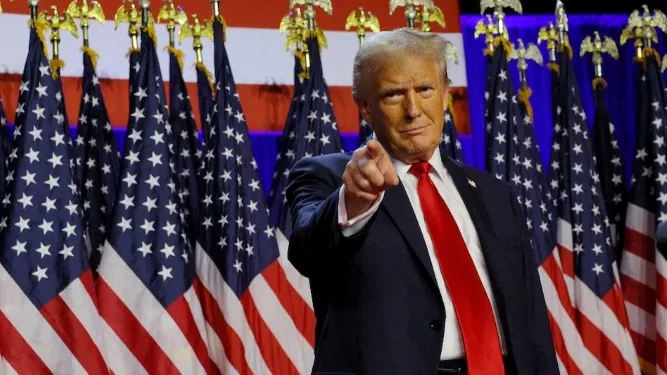The Trump tariffs impact on global economy is once again in the spotlight after recent U.S. trade policy announcements sent tremors through financial markets and diplomatic circles worldwide. Former President Donald Trump’s proposed tariff hike on imports — if he returns to office — has ignited fresh tensions with global trade partners, prompting leaders to weigh retaliatory measures. While the intentions behind these moves are rooted in protectionism and economic nationalism, the ripple effects are already being felt in international markets, including here in Australia.
In his renewed push for what he terms “economic independence,” Trump has pledged sweeping tariffs on foreign goods, including a blanket 10% tariff on all imports and even higher duties on specific nations. The announcement has alarmed economists, policy makers, and businesses alike, who fear the strategy could disrupt global supply chains, increase consumer prices, and invite tit-for-tat retaliation from affected countries.
World Leaders React with Outrage
Global leaders have not minced words in response. European Union officials called the proposals “brutal and unfounded,” warning that such policies undermine decades of trade cooperation and risk plunging the global economy into a spiral of protectionism. China, a primary target of Trump’s previous trade actions, has already hinted at imposing countermeasures if the tariffs materialize. Canada and Mexico, key U.S. trade partners under the USMCA agreement, have also expressed serious concerns over potential violations of trade agreements.
This isn’t the first time Trump’s trade policies have disrupted the global status quo. During his presidency, his administration initiated a trade war with China, resulting in hundreds of billions of dollars in tariffs, retaliatory duties, and a host of economic uncertainties that lingered for years. Economists note that the global economy is still recovering from those policies, along with the lasting impact of the COVID-19 pandemic.
Australian Businesses and Consumers on Alert
The Trump tariffs impact on global economy is not a distant issue for Australia. As a nation heavily reliant on international trade, especially with Asia and North America, any disruption in global commerce can have a direct impact on Australian businesses and households. Australia’s resource and agricultural sectors, in particular, could face increased export competition if global supply chains are reshuffled.
For example, if China and the U.S. enter another round of trade conflict, Chinese demand could pivot further toward Australian commodities. While that may seem beneficial at first glance, the volatility and unpredictability of such a shift could pose long-term risks for stability. Additionally, increased tariffs on Australian goods entering U.S. markets would hurt exporters and reduce profit margins for producers already grappling with inflation and logistical challenges.
Australian importers are also closely watching developments. Retailers that rely on goods manufactured in the U.S. or countries impacted by U.S. tariffs may see price increases, ultimately affecting Australian consumers. From electronics to clothing and automotive parts, higher import costs could translate into rising consumer prices across various sectors.
Economic Experts Caution Against Trade Isolation
Economists in Australia and abroad have voiced their concern about the resurgence of protectionist policies. “Trade barriers tend to escalate, not de-escalate,” said an Australian trade analyst in a recent economic forum. “Once you start down that path, you’re creating an environment of retaliation rather than cooperation.”
The Reserve Bank of Australia has so far maintained a neutral stance but is monitoring international developments closely. Any sharp disruptions in trade flows or commodity prices could influence Australia’s monetary policy decisions in the coming months.
Global Markets Show Early Signs of Volatility
Since the announcement of Trump’s tariff proposals, global stock markets have experienced increased volatility. Wall Street opened lower, while Asian and European markets followed with cautious trading. The Australian Securities Exchange (ASX) also dipped slightly amid uncertainty over potential trade shifts.
Investors are particularly worried about sectors vulnerable to tariff increases — including manufacturing, automotive, and technology. Market analysts suggest that until there is greater clarity on the implementation and scale of these proposed tariffs, uncertainty will continue to dominate investor sentiment.
What’s Next?
While Trump is not currently in office, his potential return and policy proposals are already reshaping global economic expectations. World leaders are expected to convene for emergency trade discussions in the coming months to evaluate their response. Meanwhile, businesses are being urged to diversify supply chains and prepare for multiple trade scenarios.
Australia, with its strategic economic ties across Asia, Europe, and North America, finds itself in a critical position. The nation will need to tread carefully — balancing alliances, economic interests, and trade dependencies.
Conclusion
The Trump tariffs impact on global economy serves as a stark reminder of how interconnected the modern world truly is. While policies crafted in Washington may be aimed at domestic goals, their reach is undeniably global — affecting supply chains, diplomacy, and economic stability around the world, including in Australia. As the situation evolves, Australian businesses and policymakers must stay agile, informed, and ready to adapt.



























